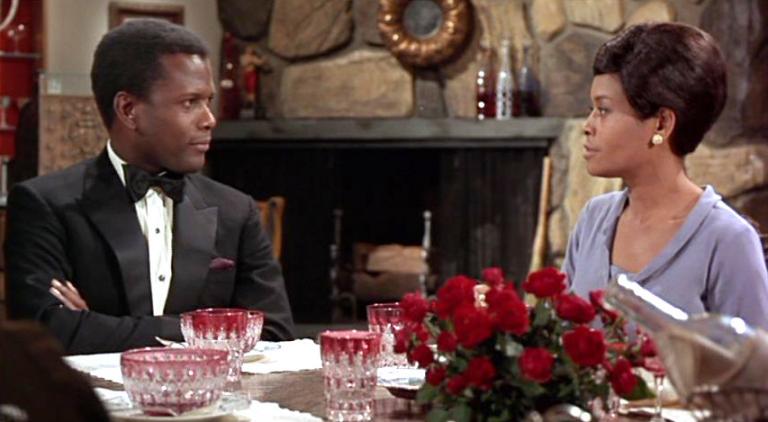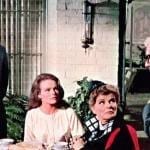The latest in a month-long series of re-posts from my Facebook marathon in April 2020.
–
Sidney Poitier marathon part 14 (1968-1969):
Sidney Poitier finished the 1960s by reuniting, at the peak of his career, with Robert Alan Aurthur, the man who wrote one of his earliest critical successes, 1957’s Edge of the City — and together they made two new movies, in two very different genres.
First up, a romantic comedy called For Love of Ivy (1968).
The film — based on an original story by Poitier (his only writing credit ever) — is about a 27-year-old black domestic servant named Ivy, who has spent her entire adult life working for a white family, and who now decides that she wants to move to the city, get her high school diploma, and become a secretary. The family doesn’t know how it will cope without her, so the two adult children convince a black ladies’ man played by Poitier to romance Ivy, in the hope that she will fall in love and stay right where she is.
It’s a familiar romantic-comedy set-up, and, naturally, it takes some familiar turns towards the end, as things get more serious than Poitier expected, and Ivy is outraged to discover the degree to which he and the adult children have been deceiving her about their motives. (Poitier agreed to the scheme in the first place partly because his company was doing business with the family’s company.) It’s a classic cad-meets-girl, cad-loses-girl, cad-changes-his-ways-to-get-girl-back kind of storyline.
What is not so familiar is the fact that this film is a comedy starring Sidney Poitier! His previous films had flashes of humour here and there — and I guess a feel-good movie like 1963’s Lilies of the Field could count as a sort of comedy — but he had never made a movie like this before, and his deadpan delivery of some lines, especially when he’s dealing with the adult son of the family (played by Beau Bridges) and the racial profiling that that man engages in, is a hoot to witness.
Which is not to say that this film is particularly great or anything like that. But it’s a striking change of pace for Poitier, and an interesting cultural snapshot in its own way, just like the more iconic films he had made the year before. And, once again, it is a film that pays special attention to a black woman’s desire for self-empowerment, a la 1961’s A Raisin in the Sun.
A few other quick points:
— Some of the humour revolves around making you think the characters are referring to race and then having the characters reveal that they were thinking of something else. E.g., when Bridges says Ivy needs a lover, his sister says “I’m afraid none of my friends would qualify” — and you might assume that the sister is saying this because none of her friends are black — but Bridges replies, “You’re right, none of them are good enough.” Later, when Bridges himself proposes to Ivy, he says he knows there’s a reason she might not think a marriage between them would work — and it turns out he’s referring to the age gap between them.
— Speaking of age gaps: Poitier is 41 playing 36, Abbey Lincoln (Ivy) is 37 playing 27, and Bridges is 26 playing 21.
— This time in LGBT references: Before asking Poitier to date Ivy, Bridges asks if Poitier is gay. Poitier’s eyes narrow, as if to say he takes offense at the question, before he says, “No I’m not.” Bridges replies, “No, well, you can’t hardly tell these days, man.” Note: this movie came out one year before the Stonewall riots.
— Poitier messes with Bridges and his sister at one point by pretending to have drugs in his pocket (it’s actually aspirin) and by pretending to be interested in an inter-racial orgy. “I know where it’s at with people like you in the suburbs,” he says. “Wife-swapping and key parties!”
— Ivy reveals that she’s been using birth-control pills. They were given to her by the daughter/sister of the family, but Ivy says the pills were the wife/mother’s originally. Birth control pills were first made available in the U.S. in 1960, just eight years before this movie came out.
— When Poitier’s character first meets Ivy, she can tell he’s from the West Indies because of his accent. (Poitier grew up in the Bahamas.) In a later scene, when she’s really angry with him, she uses “West Indian” as an epithet.
— This film arguably has Poitier’s first bed scene, though Ivy is wearing something (i.e. a robe). In 1970’s They Call Me Mister Tibbs, Poitier and his character’s wife will both appear to be naked under the covers, though the covers will go up to their chests.
— This is one of only three films that Lauri Peters starred in; she plays the adult daughter of the family. I recognized her from 1963’s Summer Holiday, where she played Cliff Richard’s love interest.
— Reunions: In addition to Aurthur the screenwriter, the film reunited Poitier with composer Quincy Jones and actor Carroll O’Connor, who had had a bit part as a truck driver in 1958’s The Defiant Ones. (O’Connor would go on to play the Rod Steiger role in a TV-series version of In the Heat of the Night between 1988 and 1995.)
— This was the last of Poitier’s films to receive any Oscar nominations. In this case, the nomination was for the theme song, co-written by Jones and Bob Russell; it lost to ‘The Windmills of Your Mind’ from The Thomas Crown Affair, which was co-written by Alan and Marilyn Bergman, who had collaborated with Jones on the songs for 1967’s In the Heat of the Night.
Next up, a crime film called The Lost Man (1969).
This film was a loose remake of the 1947 Carol Reed film Odd Man Out, with Poitier in the James Mason role as a political militant (Irish in the original film, African-American in the remake) who is wounded during a robbery.
Poitier spends the first part of the movie behind sunglasses that give him a harder, tougher look, but after the robbery goes bad, he is essentially unmasked, and he becomes more and more vulnerable as the story progresses. Most notably, the Poitier character becomes involved with a white social worker played by Joanna Shimkus, who went on to become Poitier’s second wife in real life. (He had already been divorced from his first wife for four years when this movie came out.)
I didn’t take a whole lot of notes during this one. I did notice how the dialogue was full of words like “groovy”, “bread” (for money) and “pigs” (for cops), and I enjoyed seeing Paul Winfield (who I know primarily from 1982’s Star Trek II: The Wrath of Khan and 1984’s The Terminator) in his first credited big-screen role, as a member of Poitier’s gang. The score by Quincy Jones — his fourth for a Poitier film — is also pretty good, and probably better than the film deserves.
A few extra notes:
— Poitier’s character mentions that his dad was a preacher. This is vaguely reminiscent of how his character in 1958’s The Defiant Ones said his dad was a “Bible thumper”.
— This was not only the third Poitier film written by Aurthur, it was also the only film directed by him. (You might be familiar with Aurthur’s ex-wife Bea, of Maude and Golden Girls fame; she kept a version of his surname as part of her stage name after they got divorced in 1950.)
— Reunions: In addition to Jones and Aurthur, both of whom had worked with Poitier on For Love of Ivy, this film also brings back folk singer Leon Bibb, who had small roles in both films (as Poitier’s business partner in For Love of Ivy and as a member of Poitier’s gang in The Lost Man). Bibb moved to Vancouver the year this movie came out and lived here until his death in 2015.
–
The image above shows Sidney Poitier and Abbey Lincoln in For Love of Ivy.













